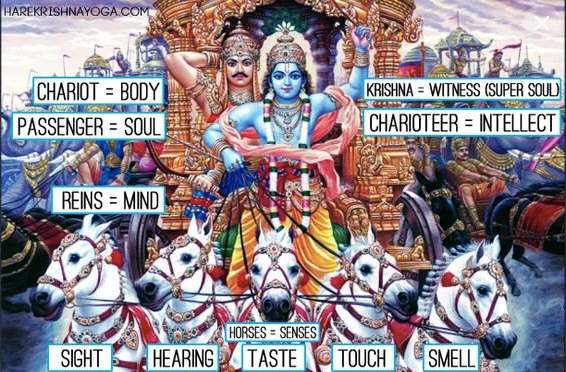Why do bad things happen to good people like you? Why don’t you get what you deserve? And why do others lead happy lives while yours feels like a blackhole that sucks in any sign of happiness?
Most of us are tired of trying to get rid of bad karma, of waiting for our lives to turn around. Death seems to be the only respite from pain and suffering, right?
Not really. Karma follows us even in death. (Karma here means phala, the fruit of our actions.) Here is a short story narrated in the Mahabharata that offers insight into how it works.
An old woman named Gautami had a young son as her only support. One day, a snake bit him and he died. Gautami was inconsolable with grief.
Seeing her plight, her neighbor, a hunter named Arjunaka, found the snake, grabbed it, and took it to her. “How should we punish this beast!”, he cried. Gautami tried to reason that her son won’t come back, so Arjunaka shouldn’t commit the sin of killing the snake, but he wouldn’t budge.
The snake, through its pain, said, “I didn’t bite the boy out of my own volition—my actions were influenced by Mrityu (death). I am a mere instrument, a potter’s wheel that has no free will but serves the potter’s wish. If someone is to blame for the boy’s death, it’s Mrityu, not me.”
Arjunaka refused to accept this. “Even if you are only an instrument, you are still the offender. By your logic, every criminal should be set free!”
Then, Mrityu appeared and pleaded its own innocence: “I didn’t ask the snake to bite the boy out of my own will. It was Kāla (time) who gave the instructions.” Hearing its name, Kāla appeared. “Neither Mrityu, nor the snake, nor I are responsible for the boy’s death, his own karma is,” it said. “Just as the potter shapes the clay per his will, we shape our karma through our actions. And karma follows everywhere, even in death.”
Gautami agreed and repeated that Arjunaka shouldn’t collect negative karma by killing the snake. This time, the hunter understood and set the snake free.
The snake’s actions were not governed by emotion—just what the situation and time demanded. That’s why it didn’t accumulate karma.
What Causes Bad Karma?
It’s a result of actions governed by the shadripu (six enemies of the mind):
- Kama: Lust
- Krodha: Anger
- Lobha: Greed
- Mada: Arrogance
- Moha: Delusion
- Matsarya: Jealousy
We can reason, justify, and rationalize our actions all we want. “I was drunk, so don’t blame me for what I did.” “I was desperate and had no choice.” Or “It’s not illegal, is it?” The best is, “They had it coming anyway.”
Karma, however, holds firm. It’s neither a bitch nor is it friendly; it’s just indifferent. You reap what you sow. What bothers us is: why is karma indifferent towards me? Why can’t it treat me better?
This assumption is not true. Think of the luxuries you enjoy today. You have more than what the richest person had a few hundred years ago. Chairs were luxuries for them, forget couches, Doritos, and the internet. How much have you done to contribute to their inventions? That is karma too.

How to Get Rid of Bad Karma
In a nutshell, actions based on the situation, time, and place, free of the shadripu, do not create bad karma, even if the actions themselves appear negative.
It’s why Lord Krishna told Arjuna to fight when the prince rationalized that killing was bad, and killing one’s own kin was worse! Lord Krishna’s message was: “Do your duty (fight) without attaching emotions to them, and you will be okay. I’ve got your back.”
(One note is that inactivity doesn’t help you get rid of bad karma. One must do their duty and accept the results. Also, acceptance is not the same as surrender or denial. Acceptance i.e. saying “Ok, this happened. What is the next step?,” is active. The remaining two are passive.)
Easier said than done, Vishal. When someone is mean to me, or when I’ve been hurt, I cannot subtract emotion.
I hear you. I am where you are. Most of us are not born with the discernment to see things for what they are. And this is the cause of our suffering to a large extent. As Petrarch said, “Like our stomachs, our minds are hurt more often by overeating than by hunger.” (In effect, the rich are unhappier than the poor and the overthinkers are unhappier than the non-thinkers.)
We must cultivate discernment, like we cultivate physical health. This comes through restraint of the senses (indriya nigraha).
Imagine yourself sitting inside a chariot. The cognition (buddhi) is the charioteer, holding the reins of mind (manas), which, in turn, control the horses, the senses (indriyas). When the mind cannot control the senses, they will run wild on any path.
Nigraha (restraint) lets you hand the reins of the mind back to the buddhi so it can guide the senses on the right path. Such a state of mind is not a punishment, a killing of our natural impulses. Rather, it’s directing your cognitive resources towards better outcomes. As the authors write in An Introduction to Indian Philosophy:
“Self-control is not a mere negative practice, it is not simply checking the indriyas, but checking their bad tendencies and habits in order to employ them for a better purpose, and make them obey the dictates of reason.”

Here are three steps to build the self-control that can rid you of negative karma in the future.
1. Breathing Exercises
Knowing what’s right is not the same as doing it. We must first become aware of our thoughts and emotions before we can correct them.
Research proves that focused breathing exercises create such awareness in us. In attentional blink experiments, for instance, participants see two letters flashed within half a second among a series of numbers. Almost always, they see the first letter but miss the second one, because they are glued to the first one. But after three months of breath-centered meditation, they can “let go” of the first letter and notice the second one. (Atheists benefit from this as much as theistic people.)
My personal experience aligns with this. Since I began practicing Shāmbhavi Mahāmudra Kriyā over two years ago, a gap has developed between my thoughts and me. In many situations (but not all), I can witness my thoughts and ask, “Is this the right thought to have?” If the answer is no, I can course-correct.
You don’t have to start with an intense practice. Simple guided mindfulness meditation, done regularly, will suffice.
2. Physical training
Physical training is another excellent tool to practice awareness in the moment. Whether you’re playing sports, doing yoga, or lifting weights, focusing on your body’s form roots you in the present. An improvement in form comes from better focus.
Another benefit of physical exercise is that you unknowingly get trained in restraint. Research shows that people who exercise also eat better and become more productive at work. Plus, they smoke less, have more patience, spend less, and feel less stressed.
In other words, physical exercise improves your mental health and how you use your cognitive faculties.
3. Dispassion for self, passion for everything else
These words by Sadhguru hit me hard!
We’ve made everything about us when almost nothing is. My best friend getting into a relationship makes me sad because he will spend less time with me. My colleague buys a nice car after investing for years. While I, who was splurging on things I didn’t need, complain that it’s unfair because I’m broke.
Then, what will drive my actions? Yup, the shadripu. And what will it create? The very result that I don’t want.
Instead, think less about what you can get and more about what you can do. While treating people, paying attention, working, or engaging in hobbies. If you can subsume your identity, not just your ego, in being useful to others and yourself, your happiness will grow and bad karma will reduce.
Summing Up
Karma is neither a bitch nor is it friendly… nor does it hold grudges. It has a simple law: you lie in the bed you make.
As Kāla said to Arjunaka, our actions shape our karma the way a potter shapes clay as per his wishes. Base your actions on the situation, time, and place. Gain control over your senses so the shad ripu (six enemies of the mind) don’t dilute your actions. And you will get rid of bad karma in the future.
I’ll leave you with Swami Vivekananda’s sage words:
“Some Karma we have worked out already, some we are working out now in the present, and some are waiting to bear fruit in the future. The first kind is past and gone. The second we will have to work out, and it is only that which is waiting to bear fruit in the future that we can conquer and control, towards which end all of our forces should be directed.”
